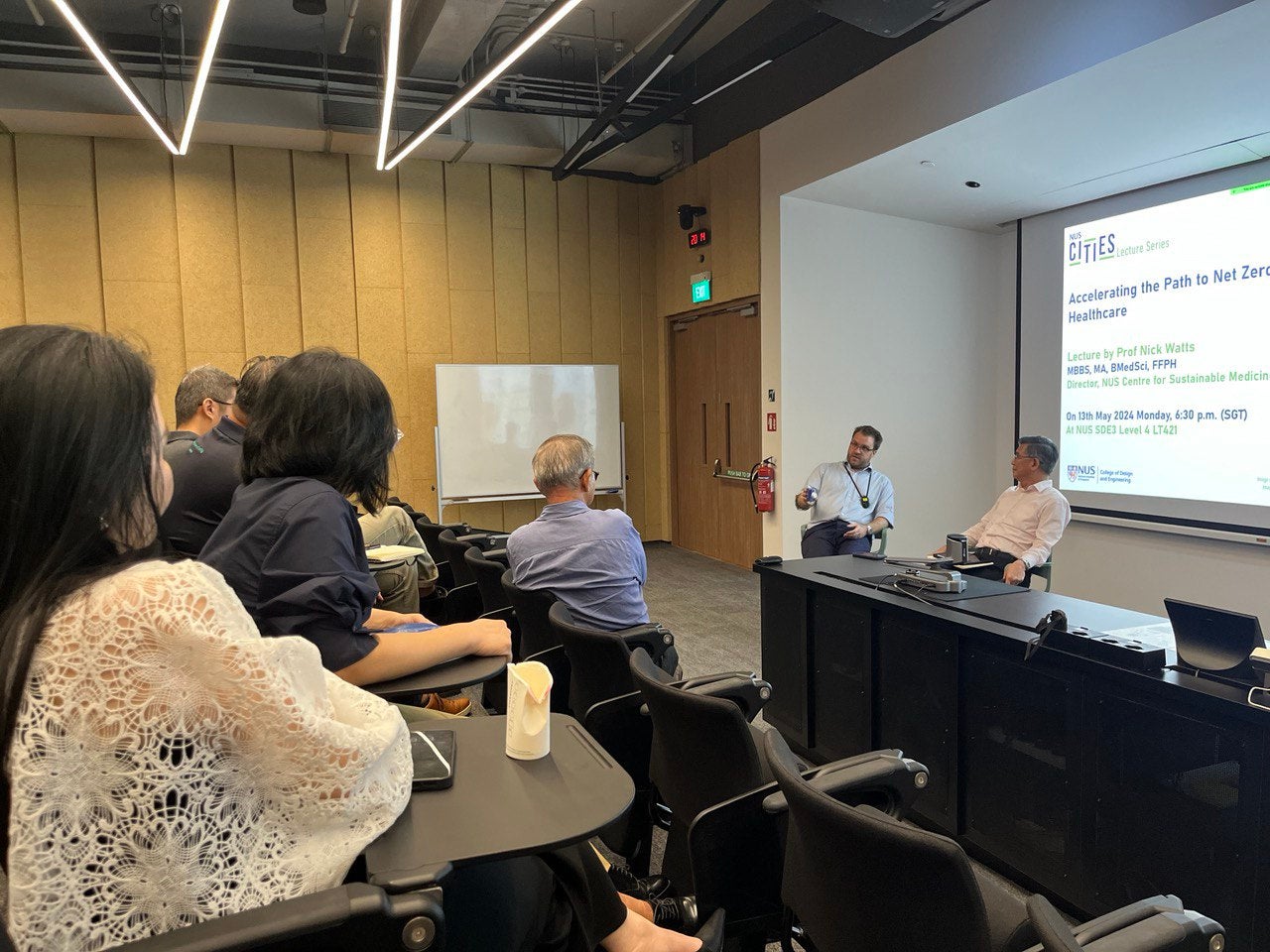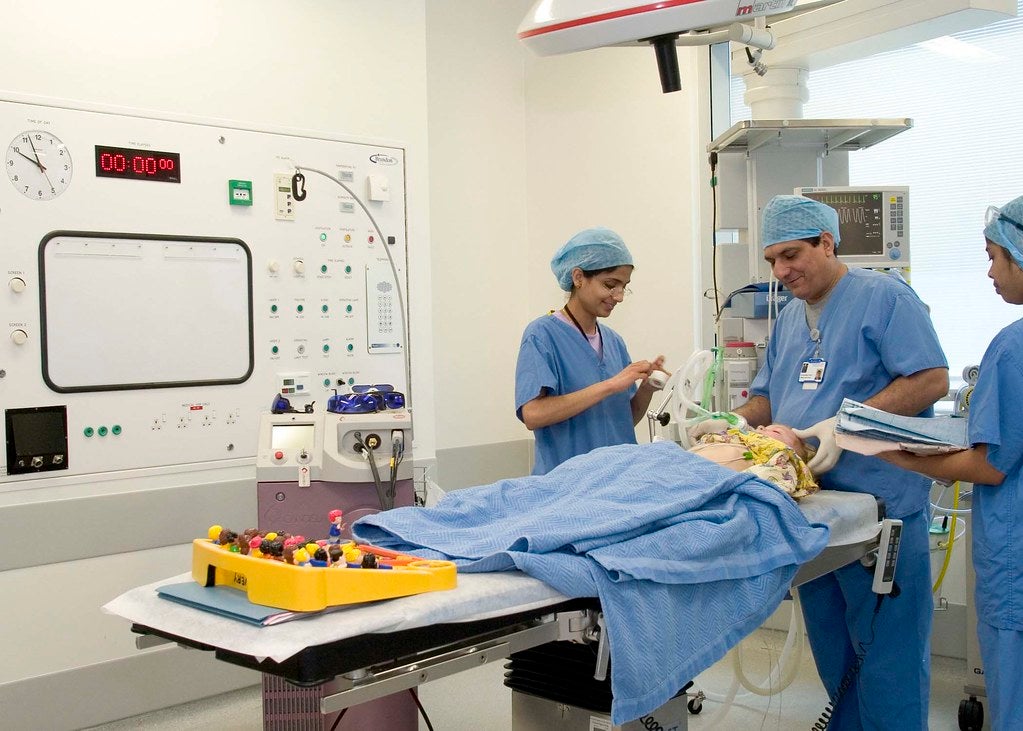How the UK’s National Health Service cut emissions
Today, healthcare contributes to a significant proportion of global greenhouse gas emissions. Nick Watts, Director of the NUS Centre for Sustainable Medicine, in an instalment of the NUS Cities Lecture Series, explained what it would take for the healthcare sector to decarbonise to meet the challenges of climate change, while enhancing clinical care for patients. We review the key takeaways.

Guest Speaker:
Nick Watts,
Director of the NUS Centre for Sustainable Medicine, was previously Chief Sustainability Officer at the United Kingdom’s National Health Service. He founded the Global Climate and Health Alliance, as well as the UK Health Alliance on Climate Change, which are dedicated to strengthening the health profession’s voice in response to climate change.

Healthcare systems and the health of patients will be affected by climate change. It will accelerate the spread of infectious diseases. Increasing frequency and intensity of heatwaves will increase the likelihood of people suffering from heart and kidney disease and failure. Greater occurrences of floods and storms will increase the chances of cholera, injuries, and deaths. In this volatile environment, healthcare systems cannot remain stable or resilient, and provide high-quality healthcare to their patients, if they do not become sustainable systems responsive to the challenges wrought by climate change.
The NHS (National Health Service) in the UK has been successful in drastically reducing emissions without compromising the quality of healthcare. In fact, it has helped the quality of healthcare to improve. The NHS’ greenhouse gas emissions have been cut down by as much as 56% from its 1990 baseline.
Building capability and capacity
Building capability and capacity is important in the efficacy of such sustainability efforts. In this, investment in energy-efficiency measures, moving to renewable energy, electrification of fleets, and increasing digitisation are all important ways of building the basic infrastructure on which other net-zero initiatives can be founded on.
However, finances may not be the biggest challenge in making healthcare sustainable and low-carbon. It is estimated that 83% of the emissions from a healthcare system can be removed without placing much strain on capital. This is so, especially because many healthcare systems are old, adopting basic measures to improve energy efficiency already offers much gain in both reducing emissions and the cost of operations.
Technology may not be the biggest challenge, either. Excellent work advancing decarbonisation in the fields of the built environment, architecture and engineering, among others, are already having positive impacts outside of healthcare. Some of these existing measures can be adapted to the healthcare sector to create the first significant gains of decarbonisation. For instance, the ambulance fleets can be electrified to make them non-carbon emitting, using electric vehicle technology and associated systems that have already been developed in other contexts.
Facilitating healthcare professionals’ autonomy
The key to decarbonising the healthcare sector may in fact lie in “unlocking passion, innovation, excitement and anger from nurses, doctors and physiotherapists around the world”. The healthcare sector is so large and varied, that it may be impossible and insufficient to find only a few, or several, solutions that can apply across the healthcare sector. With a multitude of types of healthcare and specialisations, each addressing a particular system or part of the body, and with some catered to particular social groups, it will be necessary to innovate a multitude of sustainability solutions. In encouraging this innovation, creating the space for where the autonomy of healthcare professionals can thrive is important.
There is already a wellspring of ground-up support for tackling climate change among healthcare professionals. When healthcare professionals in the NHS were polled, 92% of them wanted their organisation to be responsive to the challenges climate change. In Singapore, it was found that 84% of healthcare professionals have the same desire.
It is important that people involved in managing the overall sustainability initiatives of a healthcare system not overstep their area of expertise. They should seek to engage with healthcare professionals on the ground, who are the ones familiar with their unique clinical contexts. Sustainability officers in the healthcare sector should ideally only provide guidelines for hospitals and places of care, giving healthcare practitioners the space to explore and innovate solutions.
Hospitals can be as bad as burning coal
The story of how the NHS managed to phase out the anaesthetic desflurane is one good example of the positive impacts that giving autonomy to clinicians on the ground can have.
Desflurane is a fluorinated gas and a potent greenhouse gas. Even though the world had largely minimised the usage of fluorinated gases in the wake of the Montreal Protocol, the medical sector persisted in using them, for instance, as anaesthetics. More than a decade ago, a healthcare professional in Sheffield wanted to find out how potent a greenhouse gas called desflurane, one of the fluorinated anaesthetic gases commonly used in operations, was. Through his research, he found that the amount of desflurane necessary for an hour’s operation produced enormous amounts of greenhouse gas emissions.
He wanted to conduct a study to determine whether it was feasible to replace desflurane with other anaesthetics and work towards ending the use of desflurane. However, there was resistance from his colleagues as they thought that desflurane was essential to high-quality healthcare. It was also thought that if its use was stopped, more patients would die from operations, despite a dearth of evidence for this.
Despite the opposition, he persevered in conducting his study and found that replacing desflurane resulted in improved recovery times and sustained good outcomes in surgeries for patients. Furthermore, it was found that replacing desflurane lowered costs for hospitals. The positive results and implications of the study convinced his entire anaesthetic department, then his entire hospital, and then the entire regional healthcare system, that replacing desflurane was good and necessary.
This has resulted in desflurane contributing to 40% of emissions in the UK from anaesthetics, to contributing to only 1.2% of emissions from anaesthetics in a relatively short span of six to seven years.

Drones over the Isle of Wight
Another interesting example is the reduction of carbon emissions from the transport of complex cancer drugs to the Isle of Wight. At the Isle of Wight, these drugs are often not stocked in the local hospital due to local conditions and need to be delivered when the need for the drugs arises and the clinicians place orders.
Originally, it was delivered by means of trucks, vans and hovercrafts, and required 36 hours before the drugs could reach the destination hospital. With the push for net-zero, and through the initiatives of clinicians on the ground, the delivery system has been changed to the use of drones. Apart of reducing carbon emissions by a significant amount, the cost of delivery has also been cut down. The time taken to deliver these crucial drugs has been halved as well.
It is when clinicians are given the opportunity and autonomy to innovate, that they feel empowered, get creative, and even find a sense of meaning and fun in the initiatives that they think up and implement. Perhaps healthcare systems around the world have something important to learn from the example of the NHS.
"Autonomy matters, capability and capacity matters, and fun matters. This isn’t a financial or technological or political challenge anymore. This is about unlocking 1,000 clinical innovators, or 100,000, or 1,000,000… When you get those three things right, that’s when you land at the fourth thing: a sense of inevitability – a sense that this is the future of medicine, that this is the future of what it means to be a high-quality clinician and a high-quality healthcare system. And so, the question becomes not, ‘Are you going to get there?’, but, ‘Are you going to get ready for the inevitable transition?"
NICK WATTS

